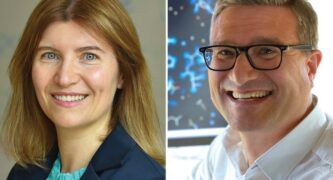
Viviana Gradinaru [Credit: Jordan Strauss/AP Images for HHMI] and André Hoelz [Credit: Alina Patke]
Caltech professors Viviana Gradinaru (BS ’05) and André Hoelz have been named among 26 new investigators of the Howard Hughes Medical Institute (HHMI). They join a community of more than 250 HHMI investigators across fields ranging from neuroscience to immunology to structural biology.
Gradinaru is the Lois and Victor Troendle Professor of Neuroscience and Biological Engineering. She is also the Allen V. C. Davis and Lenabelle Davis Leadership Chair and director of the Richard N. Merkin Institute for Translational Research as well as director of the Center for Molecular and Cellular Neuroscience. Hoelz is the Mary and Charles Ferkel Professor of Chemistry and Biochemistry.
The new investigators, selected from a pool of nearly 1,000 applicants, represent some of the nation’s top scientific and biomedical researchers and will receive flexible funding with the idea that “the most exciting and innovative breakthroughs come when exceptional individuals are given the freedom to pursue their boldest ideas.”
According to a release issued by HHMI, each of the new investigators will receive roughly $11 million in support over a seven-year term, which is renewable indefinitely pending a successful scientific review.
“HHMI is committed to supporting visionary scientists who are pursuing discoveries that will change our world for the better,” said Leslie Vosshall, HHMI vice president and chief scientific officer, in the organization’s release.
Indeed, Gradinaru and Hoelz both spoke of their excitement about the HHMI support that will give them the opportunity to pursue the scientific problems and directions they deem most exciting and promising, without having to submit grant proposals at every turn.
“As a scientist, you might have the ideas and the dreams, but those kind of just stay dreams if you don’t consider all the details: Where is it done? By whom? How do we pay for it? What are the steps? Now a lot of that has been taken care of by HHMI,” Gradinaru says. “When I shared the news with the lab, they were so happy because of this feeling that we will have fewer barriers to execute on our dreams—especially the difficult ones.”
Hoelz adds: “In the end, this means that you don’t have to worry about whether you don’t go after the easy results or if the idea you have is too risky. I think it is every scientist’s dream to ultimately have time. I am extremely happy that this is giving me and my lab time to invest in the research we care deeply about and to really push into the next phase of our work. For me, this is as huge as it gets.”
The research
For the past decade, the Gradinaru lab has focused on developing neuroscientific tools to help understand and repair the brain by using a variety of disciplines—chemistry, directed evolution, biology, and data science. Specifically, she and her team work with viruses depleted of their infectious ability to learn how they access cells, studying how they make their way across perhaps the hardest path in our bodies, known as the blood–brain barrier. Then, they transform the viruses into vehicles for delivering research tools and therapies. Today, Gradinaru says, the tools they have developed are teaching researchers in her lab about important basic biology, such as differences in the blood–brain barriers found across strains and species.
“This selection by HHMI is a very deep validation of the work my team has done over the last decade,” Gradinaru says. “The incredible students, postdocs, and staff in my lab have worked very hard on this mission. Being named an HHMI investigator is a confirmation and a boost in that what we’re doing is valuable and is to be continued and amplified.”
Gradinaru earned her undergraduate degree at Caltech in 2005 and her doctoral degree at Stanford in 2010. She came back to Caltech as a visiting associate in 2012 and became an assistant professor the same year. In 2017, Gradinaru was named director of the Center for Molecular and Cellular Neuroscience, part of the Tianqiao and Chrissy Chen Institute for Neuroscience at Caltech. She was named professor in 2018 and the Troendle Professor in 2023. Earlier this year, Gradinaru was named the Allen V.C. Davis and Lenabelle Davis Leadership Chair of the Richard N. Merkin Institute for Translational Research. Most recently, the Carnegie Corporation of New York recognized Gradinaru, born in Romania, in its 2024 Class of Great Immigrants.
Hoelz has spent more than 20 years working out the structural details of the nuclear pore complex (NPC), a complicated and vitally important channel within eukaryotic cells that regulates all that goes in and out of a cell’s nucleus, the membrane-bound region that holds its genetic material. When Hoelz was in school, people told him that no one would ever be able to solve the full structure of the NPC. It is, after all, made up of more than 1,000 individual proteins. But he has stuck with it, finding new ways to approach the most difficult challenges within the problem, applying new technologies to the effort, and collaborating with additional groups. In 2022, the journal Science dedicated a special issue to the work of Hoelz’s group and a few others around the world that helped solve the structure of the NPC, calling it “a triumph of experimental structural biology.”
The Hoelz lab continues to focus on the NPC, how it is assembled, how it interacts with other macromolecules, how it functions, and the role it may play in disease.
“This is one of the most humbling moments of my entire life. I feel unbelievably grateful to be named an HHMI investigator,” Hoelz says. “It’s a huge honor and an incredible recognition of the people in my lab who have really pushed the envelope and gotten the work done. And I believe this will help them focus on the most important work—irrespective of how difficult it may be— that will be the foundation of their future independent careers.”
Hoelz earned his bachelor’s and master’s degrees at the Albert Ludwig University of Freiburg in Germany in 1993 and 1997, respectively, and his doctoral degree at The Rockefeller University in 2004. He joined the Caltech faculty as an assistant professor in 2010, was named professor in 2016, and the Ferkel Professor in 2023.
Other HHMI Investigators from Caltech include:
– David Anderson, the Seymour Benzer Professor of Biology, Tianqiao and Chrissy Chen Institute for Neuroscience Leadership Chair, and director of the Tianqiao and Chrissy Chen Institute for Neuroscience at Caltech
– Michael Elowitz, the Roscoe Gilkey Dickinson Professor of Biology and Bioengineering
– Elliot Meyerowitz, the George W. Beadle Professor of Biology
– Doug Rees, the Roscoe Gilkey Dickinson Professor of Chemistry
– Mikhail Shapiro, the Max Delbrück Professor of Chemical Engineering and Medical Engineering
More information about HHMI’s Investigator program can be found online.














 11 comments
11 comments


